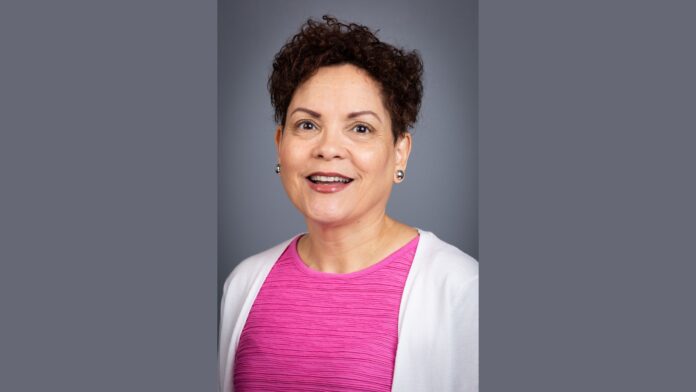Evelyn Torres was recently named executive director of Action Wellness, the organization that began as Action AIDS at the height of the HIV epidemic. “The unique thing about Action Wellness is we’ve been here from the beginning,” Torres said. “It was founded by volunteers — people from the community — who saw their friends and family members dying in 1986 and came to help.”
Torres follows in the footsteps of Kevin Burns, who retired in June 2023 after serving as the executive director for 18 years (with 34 years total working at the organization).
“It’s like coming home,” said Torres, who first joined Action Wellness as an intern in 1995 and has continued to work in the field of HIV care and management ever since. Most recently, she served as Advisor to the Director at the Philadelphia Health Department’s Division of HIV Health (DHH) where she helped the city develop a strategy to end the HIV epidemic in Philadelphia by 2030.
In tangible terms, that’s a goal to reduce new infection rates by 75% before 2025 and by 90% before 2030. The city is inching toward that goal thanks to organizations like Action Wellness, which offers HIV prevention, treatment and support services.
Despite lower rates of new transmissions overall, people of color continue to be diagnosed at higher rates than non-Hispanic, white Philadelphians. Torres, who identifies as a member of the LGBTQ+ community, said, “It’s not only my queerness per se but also that I’m a Puerto Rican woman of a certain age that is in keeping with the demographics of the HIV epidemic.” Her work is informed by these intersections.
The grief she felt in the earlier days of the crisis also guides her. Her cousin, Jaime, died in 1988 due to AIDS.
“I witnessed that stigma for him,” she said. “I remember him being in the hospital and his mother going in and bathing him and feeding him because [hospital workers] wouldn’t touch him.”
At the time of his death, Torres worked in the banking industry but was inspired to study social work. She received her undergraduate degree from Rutgers University then later obtained an MBA with a concentration in Health Administration from Eastern University.
“I found my passion when I got to work in the HIV field,” she said. “I’ve been doing it more than 20 years now, and what keeps me going is the resilience these communities have despite everything they’re up against.”
Torres explained that poverty is often a driver of health inequity.
“We have to look at the broader issues of structural inequity and how we can, if not solve them, at least mitigate them as agencies,” she explained. “That’s the only way we can hope to end the HIV epidemic.”
Her own experiences of poverty during childhood give Torres a personal understanding of its impact on wellbeing — and she now works to combat the overlap between health inequities and marginalization, including barriers to resources related to racism, transphobia, homophobia, and other stigmatization or discrimination.
She appreciates that the work of early activists has led to legislative measures, including the Ryan White CARE Act which was passed in 1990. This continues to fund not just HIV treatments and preventative care but also helps Action Wellness provide housing, utilities, emergency financial assistance, food vouchers, and other tangible support to people impacted by HIV. “I call these ‘wrap-around’ services,” Torres said, because they support people holistically to combat those structural inequities.
But she highlighted that this is considered discretionary funding, explaining, “Depending on who gets elected nationally, that could disappear.”
Torres noted that people today don’t always realize the need for continued activism, but HIV is still highly stigmatized and care is not always accessible. Thirty-five states, including Pennsylvania and New Jersey, have laws that criminalize aspects of living with HIV. In Texas, insurers are no longer required to cover PrEP, and even throughout the Philadelphia area, it can be difficult to find competent care for HIV-positive patients and preventative care for others — especially in suburban and rural regions.
Action Wellness wants to strengthen its impact where it can. In 2016, the organization expanded its mission to support people with substance use disorders and all chronic illnesses.“It’s a natural collaboration we have with the city to do this work because of rising rates of HIV and the opioid epidemic,” she said.
“We also know that for people who have HIV and substance use disorders or other chronic diseases… like diabetes, there are great health inequities depending on your race and economic status,” she said, pointing to the organization’s effort to provide holistic, intersectional, trauma-informed support.
Action Wellness also connects clients to unique opportunities — like “Immediate Seating,” which provides free or low-cost tickets to local events, and the “Buddy Program,” which keeps people with chronic illnesses linked to peers.
Moving forward, Torres wants the organization to equip clients with educational tools that inform them of their rights as patients, teach them to self-advocate in healthcare settings, and help them navigate the system. She also hopes to bring back previously well-attended focus groups so client feedback can direct the organization’s programs and offerings. She said, “I think it’s important to get input and see what people are saying before you act.”
As she takes on this new role, she reflects on how her work with clients has changed over the years. At the beginning of this epidemic, Torres journeyed with her clients as they prepared for death — but today, she’s working to end the epidemic and helping people find resources so they can live their lives. She added, “The work we do is hopeful work.”

